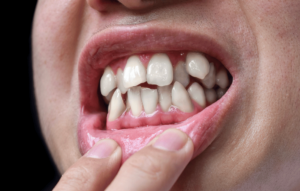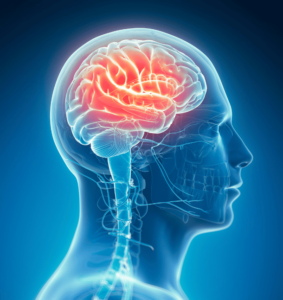Modern medicine and dentistry have done wonders for addressing the symptoms of jaw-related issues, but they’ve left a crucial question unanswered: why are so many of these problems becoming so common? From the epidemic of braces and wisdom teeth extractions to jaw pain and sleep apnea, the underlying cause has been mostly ignored over the years.
Recent research, including groundbreaking work from Stanford University, suggests that declining jaw health is not a genetic inevitability but a lifestyle disease. This hidden epidemic of shrinking jaws has far-reaching implications for men’s health, touching everything from sleep quality to long-term physical resilience.

What’s Happening With Our Jaws??
Historically, the shrinking of human jaws has largely been blamed on genetics. However, research paints a much more nuanced picture. Anthropologists studying pre-industrial human skulls have found stark differences between our ancestors’ jaw structures and ours. Pre-agricultural humans had wide, well-formed jaws with minimal tooth crowding or misalignment. Even just 150 years ago, people experienced fewer dental issues compared to today.
experienced fewer dental issues compared to today.
Modern jaw-related health problems – overcrowded teeth, malocclusion (misalignment of teeth), and sleep-disrupting conditions like obstructive sleep apnea – are not hereditary. As Stanford researchers emphasize, there hasn’t been enough evolutionary time for our genetics to change so drastically. Instead, lifestyle changes, from dietary habits to how we breathe and sleep, are driving this epidemic. In other words, we’ve shaped the problem ourselves.
The Role of Lifestyle in Jaw Decline
Jaw growth and health are influenced by the mechanical forces applied during childhood development. Our ancestors chewed tough, fibrous foods that required significant jaw strength, which stimulated bone growth and muscle development. Modern diets, dominated by processed and soft foods, have all but eliminated this natural stimulation. As a result, jaws are growing smaller, weaker, and less functional.
Another significant factor is oral posture – the position of the tongue, teeth, and jaws when not speaking or eating. Proper oral posture involves keeping the tongue resting against the roof of the mouth, the lips sealed, and breathing through the nose. Poor posture, like habitual mouth breathing or open-mouth sleeping, disrupts jaw development and leads to narrower airways and misaligned teeth.
The Impacts of Poor Jaw Health on Men’s Well-being
Sleep and Energy Levels
Declining jaw health often leads to obstructive sleep apnea (OSA), a condition where the airway collapses during sleep, causing breathing interruptions. Men with OSA frequently wake up tired, suffer from poor focus, and face increased risks of heart disease, high blood pressure, and even Alzheimer’s. Sleep deprivation compounds stress levels, creating a vicious cycle of declining health.
Chronic Jaw Pain
Many men experience temporomandibular joint (TMJ) disorders, which cause persistent jaw pain, headaches, and difficulty chewing. Weak jaw structures are more prone to misalignment and stress-related pain.
Aesthetic and Functional Concerns
A well-formed jaw is not just about aesthetics – it impacts speech, eating, and even athletic performance. Weak jaws can cause imbalances in facial muscles, affecting symmetry and function.
Mental Health Struggles
Poor sleep caused by conditions like sleep apnea can lead to mood swings, depression, and anxiety. Additionally, the chronic pain associated with TMJ disorders can create a mental health burden.
More directly though, there is a key connection between jaw health and mental health that lies in the act of chewing itself. Chewing tougher, fibrous foods stimulates blood flow to the brain and promotes the release of neurotrophic factors – proteins that support the growth and survival of neurons. Historically, our ancestors consumed diets rich in challenging raw foods, which not only strengthened their jaws but also supported cognitive development. In contrast, today’s soft, processed foods require minimal effort from the jaw muscles, potentially reducing neural stimulation and leading to lower cognitive function over time.
How Men Can Address Declining Jaw Health
The good news is that this epidemic can be addressed, and it starts with understanding the problem and taking action. Here are some practical steps to improve jaw health:
- Chewing More and Chewing Better
- Incorporate tougher, less processed foods into your diet. Eating raw
 vegetables, nuts, and tougher cuts of meat can help engage the jaw muscles. For children, avoid feeding exclusively soft or pureed foods and encourage chewing from an early age.
vegetables, nuts, and tougher cuts of meat can help engage the jaw muscles. For children, avoid feeding exclusively soft or pureed foods and encourage chewing from an early age.
- Incorporate tougher, less processed foods into your diet. Eating raw
- Correcting Oral Posture
- Rest your tongue against the roof of your mouth.
- Keep your teeth lightly touching or slightly apart.
- Close your lips and breathe through your nose.
- Breathing Exercises
- Nasal breathing, especially during physical activity and sleep, strengthens the muscles around the jaw and improves overall health. Mouth breathing, on the other hand, can worsen jaw misalignment and contribute to poor posture.
- Jaw Strengthening Exercises
- Use tools like Jawzrsize or similar devices to work out your jaw muscles and promote strength and tone. These can be a simple addition to your daily routine to counteract the effects of modern diets and lifestyles.
- Proper Sleep Practices
- Avoid overly soft pillows that encourage the mouth to fall open while sleeping. Consider using supportive pillows that promote nasal breathing and proper neck alignment.
- Early Interventions for Children
- For fathers, it’s crucial to focus on preventing these problems in kids. Promote healthy chewing habits, ensure good oral posture, and address any early signs of jaw misalignment with an orthodontist.

- For fathers, it’s crucial to focus on preventing these problems in kids. Promote healthy chewing habits, ensure good oral posture, and address any early signs of jaw misalignment with an orthodontist.
- Orthodontic Solutions
- For adults, jaw-strengthening exercises and orthodontic interventions like palate expanders can help correct issues. Forward-thinking orthodontists are increasingly using less invasive techniques to guide natural jaw development rather than relying solely on braces and surgeries.
The Connection Between Jaw Health and Masculinity
As men, jaw health affects not only physical functionality but also perceptions of masculinity. A strong jawline has long been associated with confidence, leadership, and strength. However, the implications go far deeper. A healthy jaw is essential for optimal breathing, energy levels, and resilience – traits foundational to what it means to be a strong, capable man.
Poor jaw health reflects larger issues of neglecting basic physiological needs, such as proper nutrition, breathing, and movement. By addressing jaw health, men reclaim a part of their vitality and set an example for their families and communities.
Reclaiming Your Jaw Health
The hidden epidemic of jaw decline is both alarming and solvable. The key is awareness and action. Whether it’s making dietary changes, adopting better oral posture, or seeking professional advice, every small step can make a big difference. By prioritizing jaw health, men can improve their sleep, energy levels, and overall quality of life.
This is not just about fixing an aesthetic issue – it’s about reclaiming control over a fundamental aspect of health that impacts everything from your performance at work to your relationships and long-term well-being.
By making some of these small changes today, and staying consistent with it over time, you can ensure better health for yourself and inspire the same in the next generation. Don’t let modern habits rob you of the vitality and strength that’s inherently yours. It’s time to tackle this epidemic head-on – jaw first.


 vegetables, nuts, and tougher cuts of meat can help engage the jaw muscles. For children, avoid feeding exclusively soft or pureed foods and encourage chewing from an early age.
vegetables, nuts, and tougher cuts of meat can help engage the jaw muscles. For children, avoid feeding exclusively soft or pureed foods and encourage chewing from an early age.






